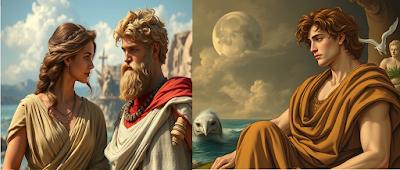Homer's "Odyssey" stands as one of the cornerstones of Western literature, a narrative that transcends time, culture, and geography. Composed in the 8th century BCE, it encapsulates themes of heroism, loyalty, vengeance, and the human condition through a rich tapestry of characters and events. At its core, the "Odyssey" is a profound exploration of conflict, both external and internal, that shapes the destinies of its characters and reflects the struggles inherent in the human experience. This essay delves into various dimensions of conflict present in the "Odyssey," examining their implications for the characters, themes, and ultimate message of the epic.
Conflict in the "Odyssey" manifests on multiple
levels: personal, familial, social, and cosmic. The epic follows Odysseus, the
hero of the Trojan War, as he struggles to return home to Ithaca after a decade
of warfare and a subsequent ten-year meandering adventure fraught with trials
and tribulations. His journey is constantly obstructed by supernatural forces,
including the wrath of Poseidon, the god of the sea, who harbors a deep
animosity towards Odysseus for blinding his son, the Cyclops Polyphemus. This
external conflict between man and divine illustrates the precarious
relationship between human endeavors and the will of the gods— a prevalent
theme in ancient Greek literature.
Familial Conflict: The Strains of Absence
One of the most poignant conflicts in the
"Odyssey" is the tension experienced within Odysseus’s family,
particularly regarding the absence of the father figure. Penelope, Odysseus's
wife, undergoes her own trials as she awaits her husband's return, faced with
the relentless pressure from suitors who vie for her hand in marriage during
Odysseus’s long absence. This scenario epitomizes the conflict between loyalty
and despair, as Penelope clings to hope while simultaneously confronting the
stark reality of her situation. Her unwavering fidelity to Odysseus represents
the steadfastness that defines true love amidst chaos.
Telemachus, the son of Odysseus and Penelope, experiences his own conflict as he transitions from youth to manhood in the shadow of his father’s absence. His journey to find news of Odysseus symbolizes a rite of passage marked by trials of courage and self-discovery. Telemachus's internal struggle to assert his identity in a household overrun by the suitors reflects the broader theme of search for agency, highlighting the generational impact of conflict and absence.
The Social Conflict: Power Dynamics and Justice
The social dynamics within the "Odyssey" present
another layer of conflict, particularly in the realm of power and justice. Upon
Odysseus's return to Ithaca, he is faced with the overwhelming presence of the
suitors, whose arrogant takeover of his home epitomizes the chaos that ensues
in the absence of order and rightful authority. This usurpation not only
represents a physical conflict for Odysseus but also poses a moral challenge:
the question of justice and the rightful reclaiming of his place in the world.
Cosmic Conflict: The Interplay Between Fate and Free Will
The cosmic dimension of conflict in the "Odyssey"
underscores the tension between fate and free will, a hallmark of ancient Greek
philosophy. The gods, representing various aspects of the human experience,
intervene throughout Odysseus's journey, influencing events that shape his
fate. While characters such as Athena serve as benevolent guides, others, like
Poseidon, embody the unpredictable nature of divine influence and the chaos it
can unleash.
Conclusion: The Human Experience Through the Lens of
Conflict












